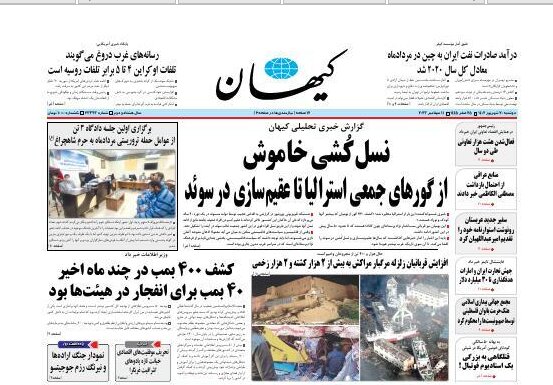Iran is important for BRICS and BRICS is important for Iran

In a commentary, Kayhan addressed the importance of Iran's membership in BRICS and quoted Bijan Khajepour as saying: "It is true that due to the U.S. sanctions, Iran cannot fully benefit from bodies like the Shanghai Cooperation Organization and BRICS.
Still, Iran’s accession to such organizations brings about prestige for the country on the international stage and increases its soft power. The main motive for the expansion of BRICS is to control the energy markets of the world. Therefore, the significance of the membership of Saudi Arabia, Iran, and the UAE is eminent. The five-member BRICS only accounts for 20% of the world’s GDP but with the new members, the figure will rise to 42% as of 2024. Also, Iran is an attractive candidate compared to other applicants. Iran's geostrategic position in international transit routes makes it a special partner in all global trade and energy alliances. The main reason for mistrust towards the U.S. on an international scale is Washington’s continuous use of financial and banking sanctions in its ties with other countries. The domination of the dollar in the world's transactions has made it possible for America to influence all financial transfers in the world and to achieve its political goals by force.
Siasat-e-Rooz: Making imaginary achievements
In its editorial, Siasat-e-Rooz talked about the latest American movements centered on Iran. It said: Joe Biden has resorted to foreign policy to win votes. Biden has designed a plan in regards to Iran and is seeking to make achievements based on an agenda that has two axes. First, he wants to advance JCPOA negotiations or de-escalate tensions with Iran. Recent reports about Iran’s increase in oil sales and a decrease in the country’s stock of uranium enriched to up to 60% purity can be seen within the same framework. American media is trying to prepare the ground for a potential return to the JCPOA. Biden has also tried to showcase some kind of authority against Iran to avoid censure by Congress. Acknowledging the seizure of an Iranian oil tanker, raising awareness about the potential presence of an Iranian plane in Crimea, and talking up the sending of American soldiers to the Persian Gulf can all be seen in the same light. In other words, it is safe to say that Biden is trying to showcase the power of his intelligent diplomacy through both negotiation and assertion of pressure. But we must take into account that all these acts are to collect votes and have an electoral purpose. They seem more like unsupported fantasies that will not bear any fruit. The Iran issue like many other issues will remain among America's unsolvable challenges.
Etemad: Tension on the other side of Aras
In a note, Etemad discussed the intensification of the military-political movements of Azerbaijan and Armenia. It wrote: It seems that due to the suspicious movements of Azerbaijan, Baku, with the support of some of its allies such as Turkey and Israel, is more seriously pursuing the construction of the Zangezur Corridor in the Syunik province of Armenia; if this happens, Iran's geopolitical position will be significantly threatened and the country's transit route to Georgia, Russia and Europe will fall into the control of Azerbaijan. A country that has not refrained from creating tension and verbal war with Iran, especially during the past three years, and now intends to provoke a major crisis in the region by creating such a corridor. In this regard, although Iran has always declared that it does not accept any change in the borders, and even Hossein Amir Abdollahian clearly raised such an issue again last week in a meeting with Turkish Foreign Minister Hakan Fidan in Tehran, the news of some media indicate that new movements and events have been happening in the region in recent days.
Farhikhtegan: The defeat of the saboteurs and the new employer
Farhikhtegan said after the agreement between Iran and Saudi Arabia and the subsidence of unrest in Iran, Saudi Arabia and Western countries changed their policy of dealing with Iran. Instead of fully counting on the opposition, they adopted a negotiation strategy to reduce tensions with Iran. Meanwhile, the main losers were saboteurs and Persian-language media, who have lost their main employers and are currently struggling to find a new employer for themselves. The meeting of the Israeli intelligence minister with some representatives of foreign-based Persian-language media happens as the anniversary of last fall’s riots is approaching. This clearly proves that these media outlets are in close contact with the Israeli regime. Israel's number one enemy is Iran, and the regime has so far done everything in its power to hurt the Iranian nation. The public meeting of the Farsi-language media representatives with the Zionist regime’s foreign minister can be seen as a complete failure of the sabotage project. For this reason, the Zionist regime is ready to officially enter the fray to revive the anti-Iran atmosphere and heal the wound of the opposition.
